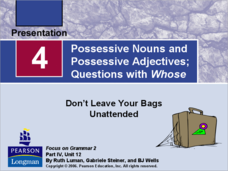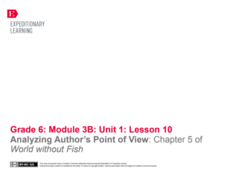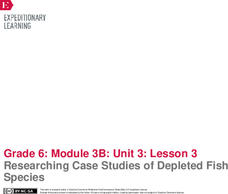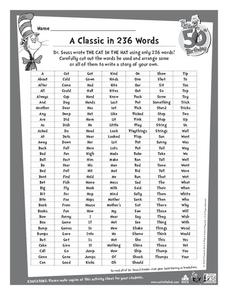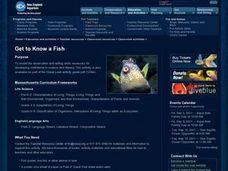EngageNY
Reading for Gist and Answering Text-Dependent Questions: Chapter 4 of World without Fish
True or false? Scholars read chapter four of World without Fish and explore the idea of a myth. They discuss in triads the meaning of the myth of nature’s bounty. Learners annotate the text on sticky notes and then answer...
K5 Learning
Multiplication Word Problems #4
Multiplication word problems about pizza? Kids will enjoy considering these real-life scenarios as they solve two- and three-digit multiplication problems. They consider how many total fish there are in 261 fishbowls, how many slices of...
Math in English
Grade 5 Fractions Word Problems
Young mathematicians apply their fractions skills in the real world with this simple word problem worksheet.
Florida Center for Reading Research
Phonics: Variant Correspondences, Fishing for Vowel Digraphs
After teaching vowel digraphs, reinforce the concept with an activity! Young scholars fish from a pile of 60 cards to match words with the same sound. Featured vowel digraphs include ea, au, aw, ow, oa, ai, ay, and ee.
EngageNY
Introducing the Struggle for Survival in the Introduction of World without Fish
No fish? Catch a word. Scholars read World without Fish and record unfamiliar vocabulary in their word catchers. They discuss word meanings as well as root words. They answer text-dependent questions before discussing the importance of...
EngageNY
Introducing World without Fish
One fish, two fish, red fish, no fish. Scholars analyze World without Fish to determine the gist, identify vocabulary, and answer text-dependent questions. As learners read, they use sticky notes to annotate the text. They also work...
Bowland
Fish Dish
Minimize the time it takes to create a fish dish. Scholars use their knowledge of time to devise an order that accounts for different constraints. Considering jobs that can be done in parallel is essential to solving the problem.
Pearson
Possessive Nouns and Possessive Adjectives; Questions with Whose
Be as possessive as you like with a grammar slideshow on possessive nouns and adjectives. Whether it's your suitcase, my suitcase, or his suitcase, elementary learners decipher the ways that possessive nouns and...
EngageNY
Researching Information about Sustainable Fishing
Go fish! Scholars continue using their research skills to find factual information to use in their consumer brochures about overfishing. They work in triads to research information about sustainable fishing practices and share their...
EngageNY
Tracing the Idea of Fish Depletion: Chapter 1
Would you, could you? Scholars read World without Fish and focus carefully on the use of the words could and would. They chunk the text into smaller sections and write annotations on sticky notes to help with comprehension. To...
EngageNY
Analyzing Author’s Point of View: Chapter 5 of World without Fish
That's an interesting perspective. Scholars read chapter five of World without Fish and use an Author’s Point of View graphic organizer to determine the author's perspective. In triads, they highlight words that support the author's...
EngageNY
Researching Case Studies of Depleted Fish Species
There's something fishy going on in the ocean. Using the resource, scholars engage in a jigsaw activity, researching a case study of a depleted fish species. After completing their research, each triad partners with another group to...
Curated OER
Guided Reading With Fish Print
Students investigate the concept of reading comprehension using Fish Print. They practice reading skills with using picture clues, using context clues, and sight word recognition for simple sentences. The teacher guides the lesson with...
Curated OER
Fishing
Learners explore the techniques and basic needs of the fisherman. In this fishing lesson, students view a demonstration of the use of fishing equipment. Learners research Iowa farm ponds and design a class mural from their...
Curated OER
Fishing: merit badge
In this fishing worksheet, students fill out short answer questions using their workbook about fishing in order to get a merit badge. Students complete 8 questions total.
Curated OER
Word Match
In this word matching worksheet, learners fill in the blanks with the correct word given and write the word on the line. Students complete 8 problems.
Reading Resource
/i/ Word List
Six silly chicks sit and fish with big strings and sticks. Help young readers develop the phonemic awareness skills needed to detect the sound structure of words and the vowel sounds in words with an exercise that asks them to...
Seussville
A Classic in 236 Words
Get in the reading spirit on Read Across America Day while celebrating Dr. Seuss' birthday with four printable worksheet activities. Included is a word search using story character's names, a quiz to test how many Dr. Seuss titles you've...
Curated OER
Full Dolch Word List
Sight words are listed based on how frequently they are used. There are 250 words on the list. This would be a good, general resource for a teachers of grades 1 - 3. It is useful to know what words your class should know, and how well...
Curated OER
Fish Puzzle
In this fish word search puzzle, students identify types of fish. Examples include catfish, perch, and shark. A list of 48 names of fish are provided to assist the students in their search.
Curated OER
Fishing Puzzle
In this fishing word search puzzle, students identify terms related to the sport of fishing. Examples include lure, boat and tackle box. A list of 45 words are provided to assist the students in their search.
Civil War Trust
Civil War Slang
Introduce a lesson on Civil War slang to your class of fresh fish. After looking at pictures from the Civil War and examining the list of slang terms, young historians write a letter to a family member as if they are a Union soldier or a...
K12 Reader
Spelling Rule Exceptions for Plural Nouns: Words That End in CH and SH
Have you done the dishes? Or closed the hatches? A practice instructional activity invites learners to check 20 words with different endings, and to add either -s or -es to each.
Curated OER
Get to Know a Fish
Learners discover the anatomy of a fish by identifying its body parts. In this oceanography lesson, students view a live fish in their classroom and draw a poster of the fish one body part at a time while identifying it....









